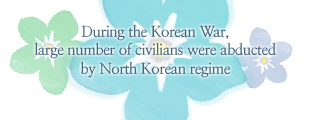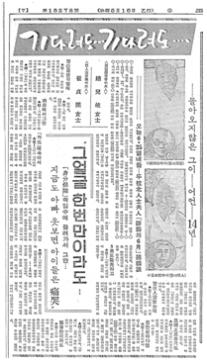Name: admin
2014-01-02 15:26:36 | Hit 2071
14 years of endless waiting since abduction on June 25, 1950
Wives of two civilian abductees recall heart-wrenching incident
P. 7, Chosun Daily, Jun. 25, 1964
Jo A-gi (wife of WidangJeong In-bo)
ChoiJeong-hui (wife of Pa-in Kim Dong-hwan)
When I think of you
Choi: First, I want to thank Chosun Daily for preparing this event for us, the families of civilian abductees, and launching the signature-gathering campaign calling for their repatriation, our one and only wish.
Jo: Whenever I think about my husband, I feel as if my heart is beingshattering into pieces. But I can’t help but feel particularlyemotional today.
Choi: Could you tell me how your husband, Widang, was abducted by the North?
Abducted from his sickbed
Jo: It was July 30, 1950. At that time, Widang was being treated for frostbite in our house in Nagwon-dong, Seoul. Some Security Bureau officers kept asking him for a favor, but were rejected. He was abducted around 2 p.m. that day. I never saw him again.
Fooled by the “card”
Choi: It was July 24, when my husband Pa-in was abducted. Before that, on June 30, three people from the North Korean Central People’s Committee broke into our house in the middle of night and arrested him. He was rescued the next day thanks to the help of a young leftist man. Pa-in hid in a friend’s house, while I told others that he had gone to the countryside to get food. We were out of food, but the surveillance was too intense for him to even think about going anywhere. One day,Security Bureau officerscame to my house and gave me a “card” that guaranteed my status and activities, and told me to bring my husband by July 24 to get the same card. On July 24, he went there to get the card because my children were sick and he was hoping to get something to eat at least. He might have known what was waiting for him; that was the last time I saw him.
Losing the will to live after the death of her third son
“Life must have been hard after Widang was gone.”
Jo: What can I say? It was simply unimaginable. We evacuated to Busanin the Retreat on January 4, and my third son joined the army as a commissioned officer there. When I heard he got killed in action, I lost the will to live. But fortunately, myremaining three sons and four daughters inherited my husband’s wisdom and grew up wonderfully. Watching my children grow and hoping my husband would come back alive was my only reason to live.
News about her daughter winning a prize, never to be delivered to her father
Choi: I have two daughters, 22 and 19 years old. The eldest daughter is studying at Ewha Woman's University, and she is exactly like her father. Pa-in would be so happy if he knew that his daughter won a prize four times for writing four novels. I miss him so much when something good happens or when I eat good food. The younger one says she doesn’t remember her father, but the elder one burst into tears holding her father’s clothes when she was young. Seeing her cry broke my heart. When I visit soldiers at the front, I feel closer to my husband rather than frightened.
Fates known only by rumor
Jo: I only know Widang’s fate by rumor or through the media. What about your husband, Pa-in?
The hope they are alive
Choi: The only way I could find out about my husband’s fate was a series of articles publishedin a daily newspaper in March last year. I looked up the writer of the article, Jo Cheol (50 years old),at the Institute of North Korea and Communism to find out more about it. I even met an arrested North Korean spy recently, but it wasn’t very fruitful. All I wantis forKorea tobe reunified as soon as possible so that I might see my husband alive.
Jo: Me too. Day and night, I only hope for my husband to come back home alive soon.
If only we could visit
Choi: I’m sure this is what other families of civilian abductees feel, but I hope we can at least send letters through the International Red Cross and see our abducted family members at the demarcation line. I will pray with all my heart that the repatriation campaign is successful.
Wives of two civilian abductees recall heart-wrenching incident
P. 7, Chosun Daily, Jun. 25, 1964
Jo A-gi (wife of WidangJeong In-bo)
ChoiJeong-hui (wife of Pa-in Kim Dong-hwan)
When I think of you
Choi: First, I want to thank Chosun Daily for preparing this event for us, the families of civilian abductees, and launching the signature-gathering campaign calling for their repatriation, our one and only wish.
Jo: Whenever I think about my husband, I feel as if my heart is beingshattering into pieces. But I can’t help but feel particularlyemotional today.
Choi: Could you tell me how your husband, Widang, was abducted by the North?
Abducted from his sickbed
Jo: It was July 30, 1950. At that time, Widang was being treated for frostbite in our house in Nagwon-dong, Seoul. Some Security Bureau officers kept asking him for a favor, but were rejected. He was abducted around 2 p.m. that day. I never saw him again.
Fooled by the “card”
Choi: It was July 24, when my husband Pa-in was abducted. Before that, on June 30, three people from the North Korean Central People’s Committee broke into our house in the middle of night and arrested him. He was rescued the next day thanks to the help of a young leftist man. Pa-in hid in a friend’s house, while I told others that he had gone to the countryside to get food. We were out of food, but the surveillance was too intense for him to even think about going anywhere. One day,Security Bureau officerscame to my house and gave me a “card” that guaranteed my status and activities, and told me to bring my husband by July 24 to get the same card. On July 24, he went there to get the card because my children were sick and he was hoping to get something to eat at least. He might have known what was waiting for him; that was the last time I saw him.
Losing the will to live after the death of her third son
“Life must have been hard after Widang was gone.”
Jo: What can I say? It was simply unimaginable. We evacuated to Busanin the Retreat on January 4, and my third son joined the army as a commissioned officer there. When I heard he got killed in action, I lost the will to live. But fortunately, myremaining three sons and four daughters inherited my husband’s wisdom and grew up wonderfully. Watching my children grow and hoping my husband would come back alive was my only reason to live.
News about her daughter winning a prize, never to be delivered to her father
Choi: I have two daughters, 22 and 19 years old. The eldest daughter is studying at Ewha Woman's University, and she is exactly like her father. Pa-in would be so happy if he knew that his daughter won a prize four times for writing four novels. I miss him so much when something good happens or when I eat good food. The younger one says she doesn’t remember her father, but the elder one burst into tears holding her father’s clothes when she was young. Seeing her cry broke my heart. When I visit soldiers at the front, I feel closer to my husband rather than frightened.
Fates known only by rumor
Jo: I only know Widang’s fate by rumor or through the media. What about your husband, Pa-in?
The hope they are alive
Choi: The only way I could find out about my husband’s fate was a series of articles publishedin a daily newspaper in March last year. I looked up the writer of the article, Jo Cheol (50 years old),at the Institute of North Korea and Communism to find out more about it. I even met an arrested North Korean spy recently, but it wasn’t very fruitful. All I wantis forKorea tobe reunified as soon as possible so that I might see my husband alive.
Jo: Me too. Day and night, I only hope for my husband to come back home alive soon.
If only we could visit
Choi: I’m sure this is what other families of civilian abductees feel, but I hope we can at least send letters through the International Red Cross and see our abducted family members at the demarcation line. I will pray with all my heart that the repatriation campaign is successful.






















 FAX : (82)31-930-6099
FAX : (82)31-930-6099
